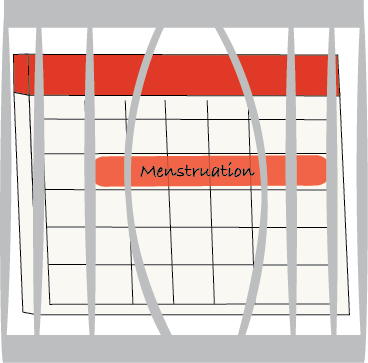Talking About Health: Menstruation and Stress
Understanding how stressors affect your period can help you achieve a healthy college experience
March 7, 2023
The topic of menstruation is often seen as taboo and “off-limits,” something that should not be seen or discussed. However, being able to speak openly about period health is essential for people who struggle with them. Various studies confirm the significant role that dialogue and participatory processes can have in improving the health of people with uteruses.
Menstruation involves the monthly shedding of blood and tissue that builds up as a lining around the uterus. The buildup occurs to prepare the body for pregnancy. However, if not pregnant, hormone levels will lower and induce the shedding of this lining, which is colloquially called a period.
Throughout this process, people who menstruate will experience various symptoms and conditions, including dysmenorrhea, or menstrual pain; amenorrhea, the absence of a period; menorrhagia, or heavy bleeding; metrorrhagia, or bleeding at irregular intervals; oligomenorrhea, or infrequent periods; and hypomenorrhea, or light periods.
Although everyone who has a period may have different experiences, one’s menstruation cycle can affect academic performance and attendance.
The effects of stress on menstrual health are unique and informative of the influences on one’s menstrual cycle that challenge everyday experiences due to pain or irregularities.
Stress can induce dysmenorrhea and encourage people who menstruate to have negative perceptions of their health. Feeling stressed can lead to more intense premenstrual symptoms like fatigue, general aches and pains, lowered school and work performance, and more. People can also experience absent or irregular periods which can, in turn, increase stress about their health (or, for those who are sexually active, accidental pregnancy).
In both a 2018 cross-sectional study of 738 health sciences students who menstruate in Saudi Arabia and a 2013 cross-sectional study of medical students in India, researchers found similar results where high perceived stress was associated with menstrual problems such as dysmenorrhea. In the 2013 study, they also found that stress levels impacted premenstrual symptoms and irregular cycles.
A systematic review of 83 studies similar to these from countries across the world, including the U.S., noted that attending higher education is strongly associated with improved health and that menstruation can interfere with learning abilities and needs. Students across the studies were found to not address these concerns with a doctor or medical professional to treat or diagnose menstrual abnormalities. According to a 2020 study, dysmenorrhea can also lead to poor sleep quality and have negative results on mood, possibly resulting in anxiety or depression.
But menstrual symptoms and pain are directly linked to absenteeism among people of various ages according to a 2017 study, which concluded that menstruation-related symptoms cause decreased productivity.
Women under 21 years of age were found to experience the most absenteeism from either work or studying, but a large majority of the cross-sectional sample of over 30,000 women said that they wished there was greater flexibility regarding the experience of menstrual-related symptoms. According to The New York Times, there are several countries across the world with menstrual leave policies, including Japan, Zambia and Indonesia. At Fordham University, there is no absence exception noted for menstrual pain or discomfort.
According to Emily Martin, vice president for workplace justice at the National Women’s Law Center, these policies may perpetuate stigma surrounding menstruation. She instead suggests implementing leave policies for both men and women experiencing chronic medical conditions.
In an academically rigorous setting, college students experience high levels of stress, which can affect a period, such as by causing its absence. According to Randa J. Jalloul an associate professor in the department of obstetrics, gynecology and reproductive sciences at McGovern Medical School at UTHealth Houston, studies show that a majority of women who experience any absent periods will recover if they were caused by weight loss or psychological stress.
She said that stress of any kind will cause an “increase in endorphins and cortisol secretion, which interrupt hormone production” and can lead to an abnormal period.
The effects of stress on menstrual health are unique and informative of the influences on one’s menstrual cycle that challenge everyday experiences due to pain or irregularities. If asking why one may be experiencing abnormalities in their menstruation cycle, stress is one possibility to consider.
According to the American Family Physician Journal, those experiencing menstrual abnormalities and irregularities can find relief through the use of nonsteroidal anti-inflammatory drugs like aspirin, topical heat or oral contraceptives. College students may also reduce menstrual-related conditions like dysmenorrhea and amenorrhea induced by psychological stress by addressing work, academic and personal life balances.

















